STL常用容器目录
- 1.string容器
- 1.1 string基本概念
- 1.2 string构造函数
- 1.3 string赋值操作
- 1.4 string字符串拼接
- 1.5 string查找和替换
- 1.6 string字符串比较
- 1.7 string字符存取
- 1.8 string插入和删除
- 1.9 string子串

1.string容器
1.1 string基本概念
本质:
- string是C++风格的字符串,而string本质上是一个
类. - 头文件:
string和char * 区别:
- char * 是一个指针;
- string是一个类,类内部封装了char\char*,管理这个字符串,是一个char*型的容器。
特点:
string 类内部封装了很多成员方法:
例如:查找find,拷贝copy,删除delete 替换replace,插入insert;
string管理char*所分配的内存,不用担心复制越界和取值越界等,由类内部进行负责。
1.2 string构造函数
构造函数原型:
string();//创建一个空的字符串 例如: string str;string(const char* s);//使用字符串s初始化string(const string& str);//使用一个string对象初始化另一个string对象string(int n, char c);//使用n个字符c初始化
示例:
#include <string>
void test01()
{
string s1;//创建空字符串,调用无参构造函数
cout << "str1 = " << s1 << endl;
//char* str2 = "Hello world!";//报错,系统默认"Hello world!"为const char*类型
const char* str2 = "Hello world!";
string s2(str2);//使用字符串str2初始化
cout << "str2 = " << s2 << endl;
string s3(s2);//调用拷贝构造函数
cout << "str3 = " << s3 << endl;
string s4(10, 'A');//使用10个字符A初始化成字符串
cout << "str4 = " << s4 << endl;
}

1.3 string赋值操作
赋值的函数原型:
string& operator=(const char* s);//char*类型字符串 赋值给当前的字符串string& operator=(const string &s);//把字符串s赋给当前的字符串string& operator=(char c);//字符赋值给当前的字符串string& assign(const char *s);//把字符串s赋给当前的字符串string& assign(const char *s, int n);//把字符串s的前n个字符赋给当前的字符串string& assign(const string &s);//把字符串s赋给当前字符串string& assign(int n, char c);//用n个字符c赋给当前字符串
示例:
void test02()
{
string str1 = "Hello world!";//char*类型字符串 赋值给当前的字符串
string str2 = str1;//把字符串str1赋给当前的字符串
cout << "str1 = " << str1 << endl;
cout << "str2 = " << str2 << endl;
string str3;
str3 = 'A';//字符赋值给当前的字符串
cout << "str3 = " << str3 << endl;
string str4;
str4.assign("Hello c++");//把字符串Hello c++赋给当前的字符串
cout << "str4 = " << str4 << endl;
string str5;
str5.assign("Hello c++", 5);//把字符串Hello c++的前n个字符赋给当前的字符串
cout << "str5 = " << str5 << endl;
string str6;
str6.assign(str5);//把字符串str5赋给当前字符串
cout << "str6 = " << str6 << endl;
string str7;
str7.assign(5, 'X');//用5个字符X赋给当前字符串
cout << "str7 = " << str7 << endl;
}
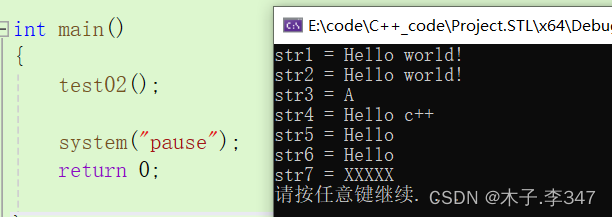
1.4 string字符串拼接
功能描述:
- 实现在字符串末尾拼接字符串;
函数原型:
string& operator+=(const char* str);//重载+=操作符string& operator+=(const char c);//重载+=操作符string& operator+=(const string& str);//重载+=操作符string& append(const char *s);//把字符串s连接到当前字符串结尾string& append(const char *s, int n);//把字符串s的前n个字符连接到当前字符串结尾string& append(const string &s);//同operator+=(const string& str)string& append(const string &s, int pos, int n);//字符串s中从pos开始的n个字符连接到字符串结尾
示例:
void test03()
{
//重载+=操作符
string str1 = "千里";
str1 += "之行"; //把字符串"之行"连接到当前字符串结尾
cout << "str1 = " << str1 << endl;
str1 += ',';//把字符','连接到当前字符串结尾
cout << "str1 = " << str1 << endl;
string str2 = "始于足下";
str1 += str2;//把字符串"始于足下"连接到当前字符串结尾
cout << "str1 = " << str1 << endl;
string str3 = "A thousand mile";
str3.append(" trip ");//把字符串" trip "连接到当前字符串结尾
str3.append("begins with you", 11);//把字符串"begins with you"前11个字符连接到当前字符串结尾
string str = " one step.";
//str3.append(str, 0, 10); // 从下标0位置开始 ,截取10个字符,拼接到字符串末尾
str3.append(str);//效果同上,将str字符串拼接至末尾
cout << "str3 = " << str3 << endl;
}

注意:对于用“ ”括住的本质是属于const char*类型的,但将其赋值给string类型时,其就变成了string类型。
1.5 string查找和替换
功能描述:
- 查找:查找指定字符串是否存在;
- 替换:在指定的位置替换字符串;
函数原型:
int find(const string& str, int pos = 0) const;//查找str第一次出现位置,从pos开始查找(返回所在位置下标)int find(const char* s, int pos = 0) const;//查找s第一次出现位置,从pos开始查找int find(const char* s, int pos, int n) const;//从pos位置查找s的前n个字符第一次位置int find(const char c, int pos = 0) const;//查找字符c第一次出现位置int rfind(const string& str, int pos = npos) const;//查找str最后一次位置,从pos开始查找int rfind(const char* s, int pos = npos) const;//查找s最后一次出现位置,从pos开始查找int rfind(const char* s, int pos, int n) const;//从pos查找s的前n个字符最后一次位置int rfind(const char c, int pos = 0) const;//查找字符c最后一次出现位置string& replace(int pos, int n, const string& str);//替换从pos开始n个字符为字符串strstring& replace(int pos, int n,const char* s);//替换从pos开始的n个字符为字符串s
示例:
void test04()
{
//查找
string str1 = "abcdefgde";//位置从0开始
int pos = str1.find("de");//在str1中查找de,返回其第一次出现的位置
if (pos == -1)//未找到返回-1
{
cout << "未找到" << endl;
}
else
{
cout << "pos = " << pos << endl;
}
pos = str1.rfind("de");//从右往左,在str1中查找de,返回其最后一次出现的位置
cout << "pos = " << pos << endl;
//替换
string str2 = "abckkkxyz";
str2.replace(3, 3, " vs ");//替换从3开始3个字符为字符串" vs "
cout << "str2 = " << str2 << endl;
}
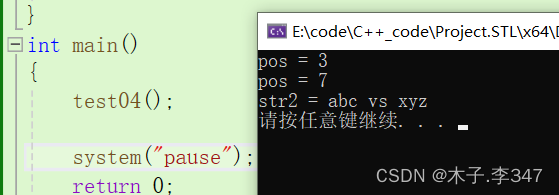
总结:
- find查找是从左往后,rfind从右往左;
- find找到字符串后返回查找的第一个字符位置,找不到返回-1;
- replace在替换时,要指定从哪个位置起,多少个字符,替换成什么样的字符串。
1.6 string字符串比较
功能描述:
- 字符串之间的比较
比较方式:
- 字符串比较是
按字符的ASCII码进行对比 - = 返回 0
- >返回 1
- < 返回 -1
函数原型:
int compare(const string &s) const;//与字符串s比较int compare(const char *s) const;//与字符串s比较
示例:
void test05()
{
string s1 = "hello";
string s2 = "aello";
int ret = s1.compare(s2);//a和h的ASCII码值分别为97,104
if (ret == 0) {
cout << "s1 等于 s2" << endl;
}
else if (ret > 0)
{
cout << "s1 大于 s2" << endl;
}
else
{
cout << "s1 小于 s2" << endl;
}
}

1.7 string字符存取
string中单个字符存取方式有两种:
char& operator[](int n);//通过[]方式取字符char& at(int n);//通过at方法获取字符
示例:
void test06()
{
string str = "hello world";
//size()字符串中字符个数
cout << str.size() << endl;
for (int i = 0; i < str.size(); i++)
{
cout << str[i] << " ";
}
cout << endl;
for (int i = 0; i < str.size(); i++)
{
cout << str.at(i) << " ";
}
cout << endl;
//字符修改
str[0] = 'x';//修改为xello world
str.at(1) = 'x';//修改为xxllo world
cout << str << endl;
}

总结:string字符串中单个字符存取有两种方式,利用 [ ] 或 at
1.8 string插入和删除
功能描述:
- 对string字符串进行
插入和删除字符操作;
函数原型:
string& insert(int pos, const char* s);//插入字符串string& insert(int pos, const string& str);//插入字符串string& insert(int pos, int n, char c);//在指定位置插入n个字符cstring& erase(int pos, int n = npos);//删除从Pos开始的n个字符
示例:
void test07()
{
string str = "hello";
str.insert(1, "XXX");
cout << str << endl;
str.erase(1, 3); //从1号位置开始3个字符
cout << str << endl;
}

**总结:**插入和删除的起始下标都是从0开始
1.9 string子串
功能描述:
- 从字符串中获取想要的子串
函数原型:
string substr(int pos = 0, int n = npos) const;//返回由pos开始的n个字符组成的字符串
示例:
void test08()
{
string email = "12346789@qq.com";
int pos = email.find("@");//返回@所在位置
string QQ = email.substr(0, pos);
cout << "username: " << QQ << endl;
}


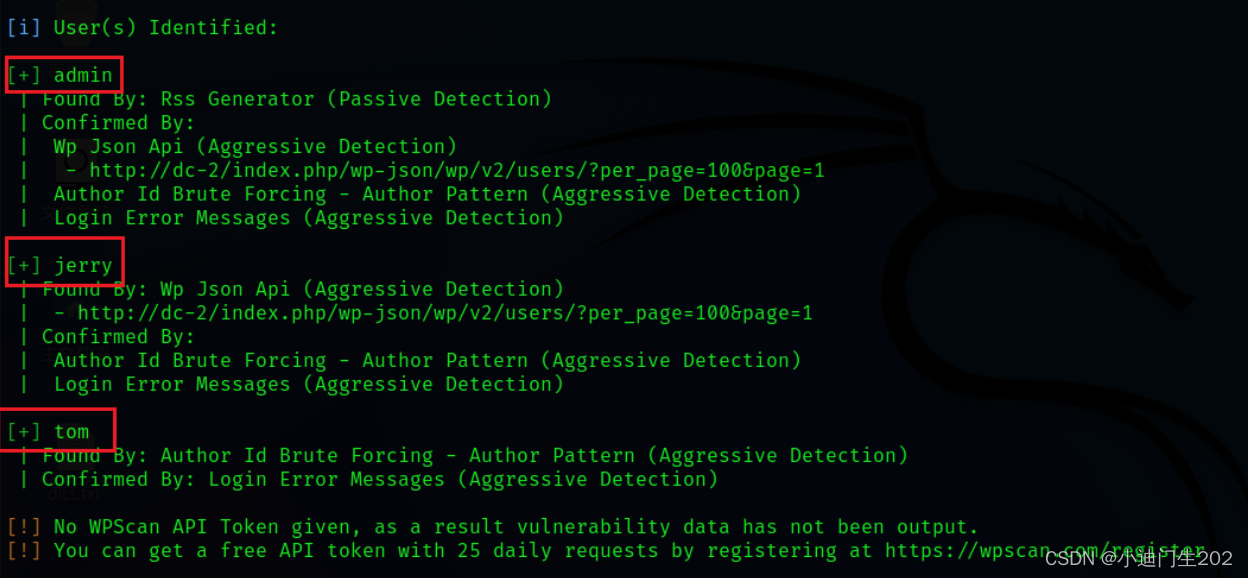



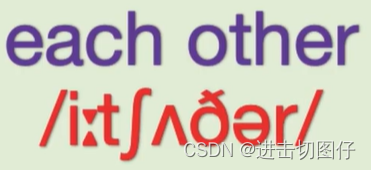


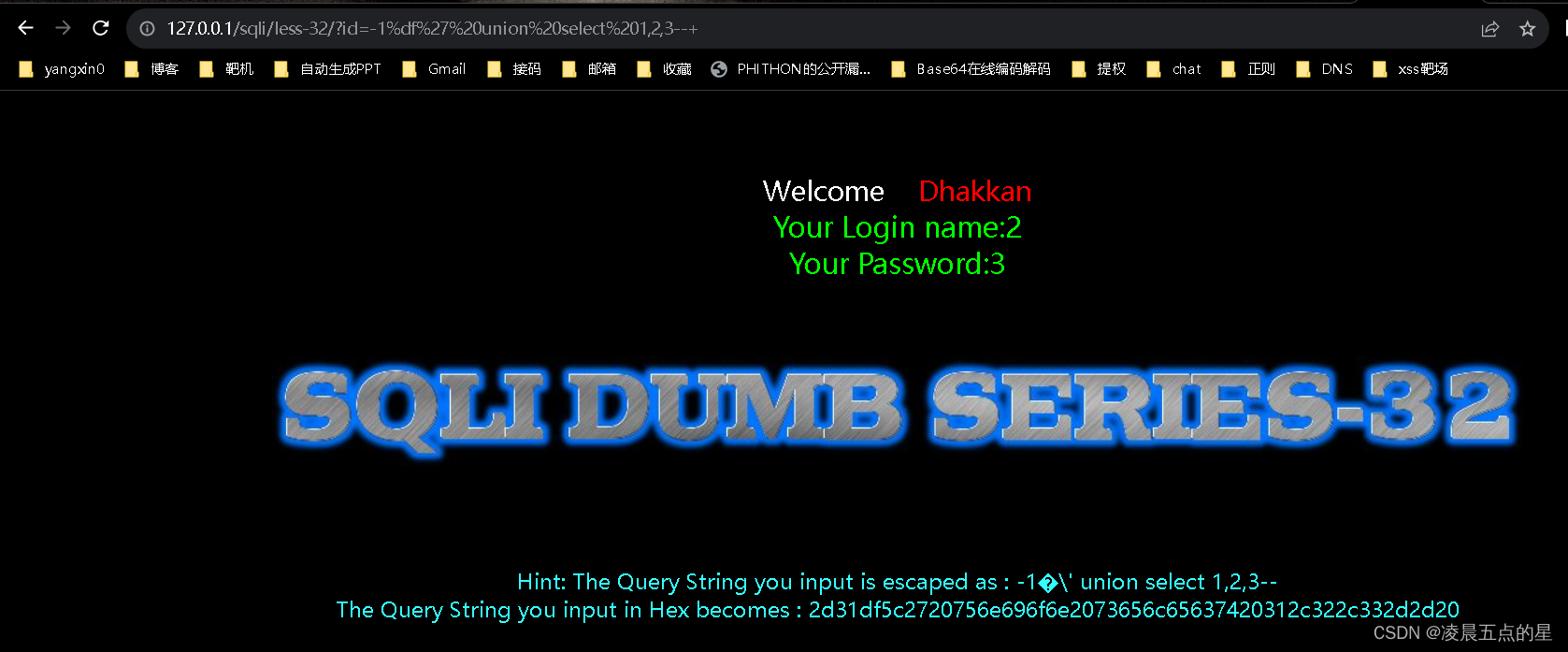




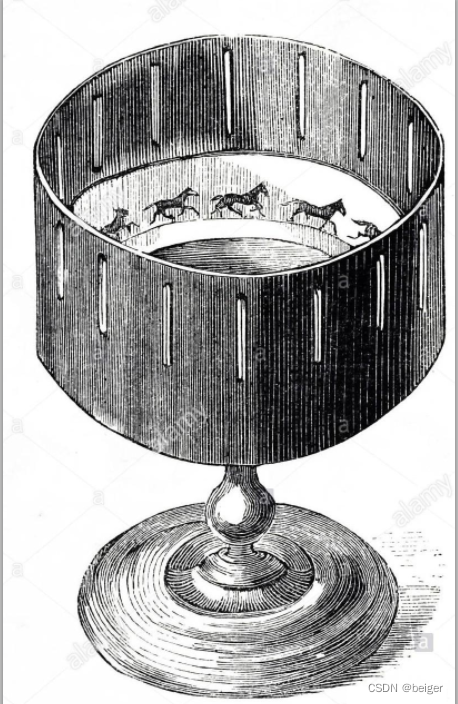

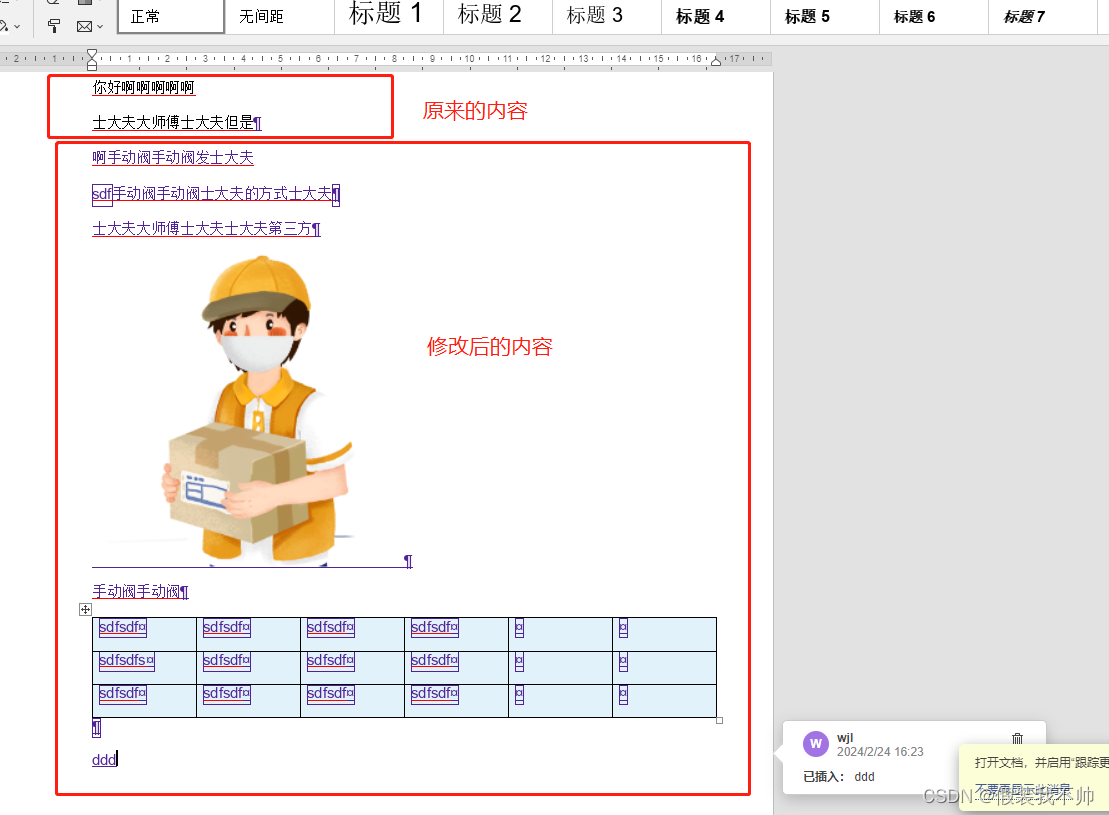

![使用 yarn 的时候,遇到 Error [ERR_REQUIRE_ESM]: require() of ES Module 怎么解决?](https://img-blog.csdnimg.cn/direct/ee57608020294fd2968810185d2c706f.png#pic_center)